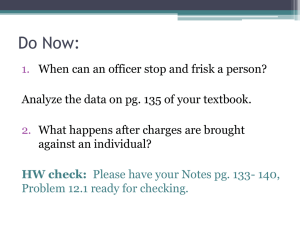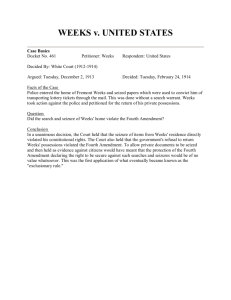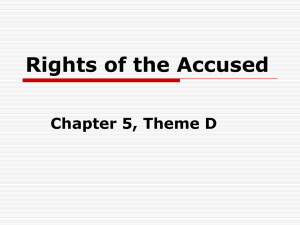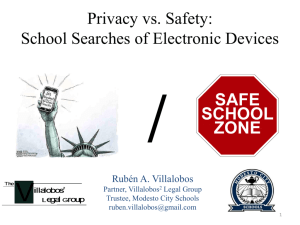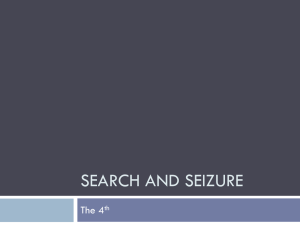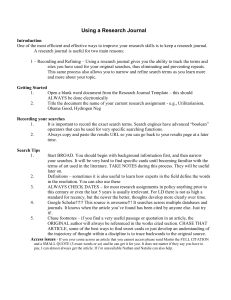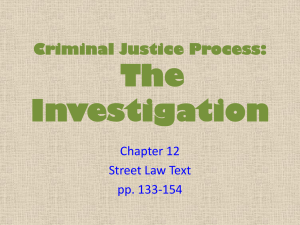CRIMINAL PROCEDURE
advertisement
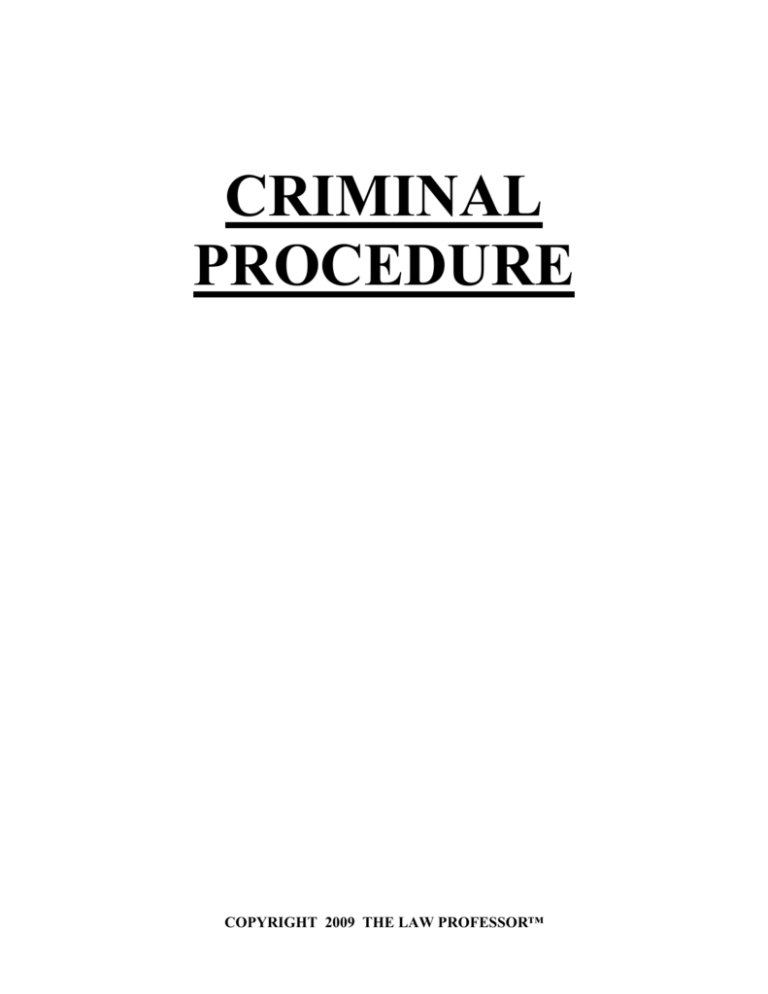
CRIMINAL PROCEDURE COPYRIGHT 2009 THE LAW PROFESSOR™ SHOPPING LIST PROFESSOR GOULD’S SHOPPING LIST FOR CRIMINAL PROCEDURE. 1. SEARCHES AND SEIZURES. 4th Amendment. Reasonable Expectation of Privacy. From Government Intrusion. 2. WARRANT SEARCHES. A Valid Search Warrant. Valid Execution of Warrants. Search Warrant Exceptions. 3. SPECIFIC SEARCHES. Consent Searches. Wiretapping and Bugging. Automobile Searches. Border Patrol Searches. Stop and Frisk v. Arrest. Warrantless Weapons Searches. Searches Incident to Arrest. Building and Administrative Searches. Special Needs Searches. 4. Exclusionary Rule. 5. 5th Amendment Privilege Against Self-Incrimination / Miranda Rights. 5th Amendment. Voluntary Statements Not Covered. Right Attaches When. What Rights / Warnings. Exceptions. Exclusionary Rule. 6. 6th Amendment Right to Counsel During Interrogation and Line-Ups. 7. Exclusionary Rule. Standing. Exceptions to the Exclusionary Rule. 8. Miscellaneous Issues. COPYRIGHT 2009 THE LAW PROFESSOR™ SEARCHES AND SEIZURES SEARCHES AND SEIZURES. 4th Amendment. Reasonable Expectation of Privacy. From Government Intrusion. Curtilage. Open Fields Doctrine. Proximity to Home, Areas within Enclosures, Nature of Use, Steps Taken to Protect from Observation. Possible Waiver of Privacy Right. Abandoned Property. Garbage. Aerial Overviews. Public navigable airspace, non-intrusive, and no intimate activity. Plain View Doctrine. Use of Mechanical Devices. Aerial Observation. WARRANT SEARCHES. A Valid Search Warrant. Neutral Magistrate. Through Probable Cause. More Likely Than Not: Person Committed Crime. Particular Information. Totality of the Circumstances Test. With Oath or Affirmation. Will Consider Incorrect Information as Either Honest Police Error or as a Perjured Affidavit. With Specific Particularization of: Place to Be Searched. Things to Be Seized. Person to Be Seized. Valid Execution of Warrants. No Unreasonable Delay. Knock and Announce Rule. Officer Must Identify themselves as a Police Officer. COPYRIGHT 2009 THE LAW PROFESSOR™ Officer Must Identify Executing a Warrant. Scope of Search. To Areas / Things / People in Warrant. Exigent Circumstances. Plain View Doctrine. Good Faith. Hot Pursuit. Consent Searches. Exclusionary Rule. ARREST IN HOME, BUT STARING OUTSIDE OF HOME. Reasonable Suspicion. Less than probable cause. Based on Objective Facts related to Criminal Activity. Subject Flees. Police May Follow into House Based on Exigent Circumstances. Once Inside House Make Arrest. Search Incident to Arrest. Wingspan Search. Protective Sweep. Plain View Doctrine. Exclusionary Rule. COPYRIGHT 2009 THE LAW PROFESSOR™ OTHER SPECIFIC TYPES OF SEARCHES CONSENT SEARCHES. Voluntariness. False Claim of Authority by Police. Valid Authority to Consent. Additional Inquiry by Police. Joint / Common Authority. Apparent Authority. Reasonable Mistake Allowed. Scope of Search. Plain View Doctrine. WIRETAPPING AND BUGGING. Electronic Surveillance. Wiretapping and Bugging. 4th Amendment Searches. Requires Warrant and Probable Cause. Consent. If even only one party consents, then no probable cause needed. AUTOMOBILE SEARCHES. Field Search for Contraband, Fruits, Instrumentalities or Evidence of Crime. Probable Cause Required, but No Warrant Required. May Search Car. Closed Containers which may Contain That Type of Contraband. Only Passenger Compartment, no Trunk. Inventory Search at Station-House after Arrest of Defendant. No Warrant Required: Based on Plain View Doctrine. Must be a Routine or Standard Procedure. Impoundment / Inventory Search Exception. Standardized Procedures. Passengers in Car. May ask to leave vehicle if concern for safety, or for a frisk for weapons. Searched if: Probable Cause to Believe Possesses Evidence of Crime. Probable Cause to Arrest. May look at Containers which are the Property of Passenger. COPYRIGHT 2009 THE LAW PROFESSOR™ SEARCHES INCIDENT TO ARREST Searches Incident to Arrest. Legal Arrest Needed. Protective Sweep. In Suspect’s Home: If Reasonable Belief Based on Specific and Articulable Facts that Another Person is Present and Potentially Dangerous, and In Area to be Swept. Adjoining Spaces. Specific and Articuable Facts Not Needed for Adjoining Spaces. Exception. Exigent Circumstances. BORDER PATROL SEARCHES. No Probable Cause or Warrant Needed. May be Detained Longer if Reasonable Suspicion of Criminal Activity. Near Border. Roving Border Patrols. Must Have Reasonable Suspicion of Illegal Activity or Illegal Presence in Country in Order to Detain. Cannot be Based Solely on Foreign Ancestry of Occupants. Fixed Interior Checkpoints. No Individualized Suspicion Needed to Detain and Question. Sobriety Checkpoints. Allowed to Check for Intoxication without Individualized Suspicion. Interest to Stop Drunk Driving Outweighs Intrusion. Drug Interdiction Checkpoints. Not Allowed Because Aims at Detecting Ordinary Criminal Activity. BUILDING AND ADMINISTRATIVE INSPECTIONS / SEARCHES FOR HEALTH AND SAFETY. Warrant Required for Non-Emergency Non-Consent Health and Safety Inspections. Administrative Probable Cause. Based on Reasonable Legislative or Administrative Standards. Exception for Closely Regulated / Special Licensed Commercial Premises. Administrative Scheme Must Advance Substantial Interest. Inspection Necessary to Further Regulatory Scheme. Statute Must Provide Adequate Substitute for Warrant. COPYRIGHT 2009 THE LAW PROFESSOR™ SPECIAL NEEDS SEARCHES. Searches by Governmental Officials Other than Police Officers. Parole / Probation Officers, School Officials, Government Employers, Drug Testing.. Applies Where: Impracticable to Secure Warrant. Governmental Interest Outweigh Intrusion to Person. Immediate Objective of Search in Not Law Enforcement Related. Search of Parolees and Probationers. Warrantless Searches Allowed without Probable Cause if Valid Regulation. School Searches. Students Have Reasonable Expectation of Privacy in their Belongings. More Discretion Given to School Officials Not Acting in Concert with Police. School Official May Search Student or Student Locker, if: Reasonable Suspicion or Grounds to Believe. Evidence of Violation of School Rules or the Law. Search Not Excessive. Government Employee. No Warrant or Probable Cause Needed for Search of Office / Desk / File Cabinets. Work-Related Search which is Reasonable Under the Circumstances. Drug Testing. Individualized Suspicion Not Practicable. Allowed Where: Immediate Objective Not to Secure Criminal Evidence. Where there are Strict Regulations, or Reduced Privacy Expectations. Not Allowed Where, and Search Warrant is Required: Immediate Objects is to Secure Criminal Evidence. Not in Response to Suspicion of Drug Use of a Target Group. WARRANTLESS WEAPONS SEARCHES. Reasonable Under the Circumstances Balancing Test. Crime Detection and Prevention Weighted Against Invasion of Personal Liberty. Applies Where Officer has Reason to Believe Suspect Armed and Dangerous. Vehicles: Areas in Passenger Compartment where Weapon may be Found. COPYRIGHT 2009 THE LAW PROFESSOR™ STOP AND FRISK V. ARREST. Reasonable Suspicion. Less than probable cause. Based on Objective Facts related to Criminal Activity. Totality of the Circumstances Test. Scope of Frisk. May Search for Weapons. May Not Search for Evidence. Stop versus Arrest. Once a stop becomes an arrest, then probable cause is needed. Reasonable Person Test. Totality of the Circumstances Suspect Not Free to Leave. Physical Show of Force or Authority Restraining Persons’ Liberty. Search is Longer, or More Intrusive, than Reasonably Necessary. Suspect is Transported. Terry Stops. Reasonable Under the Circumstances Balancing Test. Need to Search or Seize Weighed Against Invasion of Personal Privacy. Reasonable Suspicion. Specific and Articuable Facts. Reasonable Inferences From: Observations, Hearsay (with Indicial of Reliability), Profiles, Flight. COPYRIGHT 2009 THE LAW PROFESSOR™ Fifth Amendment Right Against Self-Incrimination 5th Amendment Privilege Against Self-Incrimination / Miranda Rights. 5th Amendment. “N]o person . . . shall be compelled in any criminal case to be a witness against himself.” Confessions Admissible while in Custody only if Defendant Received Miranda Warnings, Otherwise Not Admissible. Voluntary Statements. Not Covered Under Miranda. Right Attaches When: Defendant in Police Custody. Objective Reasonable Suspect Test. Whether Defendant is Free to Leave. Defendant Interrogated. Express Questioning or Functional Equivalent. Words or Actions Likely to Elicit an Incriminating Response. Confession Result of Questioning. Volunteered Statements by Defendant Not Covered. Defendant Interrogated by Authorities. Undercover Agents are Not Deemed Authorities. What Rights / Warnings. Right to Remain Silent. Anything Said Can Be Used Against Defendant in a Court of Law. Right to Presence of an Attorney before Questioning. If Cannot Afford Attorney, One Appointed Prior to Questioning if Ask. Exceptions. Waiver of Miranda Rights. Knowing, Voluntary and Intelligent. Totality of Circumstances Test. Free Choice. COPYRIGHT 2009 THE LAW PROFESSOR™ No Coercion, Deception, or Intimidation. Express Waiver. Effective. Implied Waiver. May Sometimes be Inferred from Suspect’s Words and Actions. Immunity. Transactional Immunity. Protection For Offenses Related to Subject of Questioning. Use Immunity. Protection Against Use of Testimony at Criminal Trial. Exclusionary Rule. Coerced Confessions. Massiah Doctrine. Inadmissible at Trial. COPYRIGHT 2009 THE LAW PROFESSOR™ IDENTIFICATION PROCEDURES AND COUNSEL 6th Amendment Right to Counsel During Interrogation. 6th Amendment. “In all criminal prosecutions, the accused shall . . . have the Assistance of counsel for his defence.” Right Attaches. Upon Commencement of Adversarial Judicial Proceedings. Prohibits Deliberate Elicitation of Incriminating Information from Accused. Deliberate Elicitation. Acts with Purpose of Eliciting Incriminating Information. Creates an Opportunity for Defendant to Make Incriminating Statements. In Absence of Counsel. After Adversarial Judicial Proceedings Have Commenced. Exclusionary Rule. 6th Amendment Right to Counsel at Line-Ups / Wade-Kirby Doctrine. Sixth Amendment Rights for Critical Stages of Criminal Proceeding. Waiver: Knowingly and Intelligently Standard. Defendant Asserts. Procedures without Attorney Violated Right to Counsel. OR Procedures So Suggestive as to be Violative of Due Process. Suggestive Procedures. Exclusionary Rule. COPYRIGHT 2009 THE LAW PROFESSOR™ THE EXCLUSIONARY RULE THE EXCLUSIONARY RULE. Exclusionary Rule. 4th Amendment Violations of Search or Seizure are Not Admissible at Trial. Standing. Only Person Asserting Right May Use. Exceptions to the Exclusionary Rule. Good Faith Exception. Evidence Obtained Through Reasonable Reliance on Invalid Warrant. Leon Exception, where Officer Believed Warrant was Valid. Not Applicable to Improperly Executed Warrants. Derivative Evidence / Fruit of the Poisonous Tree Doctrine. Original Illegal Evidence is Poisonous Tree. May Bar Additional / Ancillary Evidence Seized. Exceptions to Derivative Evidence. Independent Source Exception. Found During Lawful Police Activity. Found Unlawfully, but Later Obtained Lawfully and Independently. The Inevitable Discovery Rule. Evidence Would Have Been Found by Lawful Means Ultimately. The Purged Taint Exception / Attenuated Connection Principle. Tenuous Connection to Illegal Police Activity. Factors: Temporal Proximity. The Longer, Less Taint. Intervening Events: More Events, or Free Will, Less Taint. Flagrancy of Violation: Less Flagrant, Less Taint. COPYRIGHT 2009 THE LAW PROFESSOR™ MINOR ISSUES Entrapment. Defendant Induced by Governmental Agent to Commit Crime. Defendant Would Not Have Committed Crime. Predisposition / Subjective Test. Defendants’ Non-Hesitancy, Criminal Knowledge, Comments. Bad Reputation of Defendant in Community. Police Conduct / Objective Test. Likely Impact of Solicitation on Hypothetical Innocent Person. Double Jeopardy. Fifth Amendment. Attachment of Jeopardy. Grand Jury Proceedings. Federal Practice. Fifth Amendment. State Courts. Not Binding on States. Bail. Eighth Amendment. Right to Non-Excessive Bail. Individualized Consideration. Right to Plea Bargain. Common Types. Plea to Lesser Charge. Guilty, but a Lighter Sentence. Guilty to One Charge, in Order to Drop Other Charges. Receipt of Plea. Requirements. Defendant is Competent to Enter Plea. Defendant Understands the Charges. Defendant Understands Consequences of Plea. COPYRIGHT 2009 THE LAW PROFESSOR™ Discovery for the Defense. Prosecutor has a Duty to Disclose. Constitutional Claims in Federal Court. Federal Habeas Corpus. After Convicted and Exhausted State Remedies. Defendant’s Confrontation Clause Rights. Sixth Amendment. Compulsory Process. Right of Cross-Examination. Defendants’ Right to Effective Counsel. Factors Related to Professionalism: Professional Judgment, Early Interview of Defendant, Keep Defendant Informed and Consulted, Investigate Promptly and Apply Legal Skills and Knowledge. Strickland Test. Representation was Deficient, Not Just Less than Optimal. Deficient Representation Prejudiced Defendant. Reasonable Probability Outcome of Trial Would Have Been Different. Defendants’ Right to a Speedy Trial. Sixth Amendment. Attaches After Defendant Formally Accused of Offense. Factors Considered: Length of Delay. Reason for the Delay. Assertion of Right to Speedy Trial. Prejudice. COPYRIGHT 2009 THE LAW PROFESSOR™

